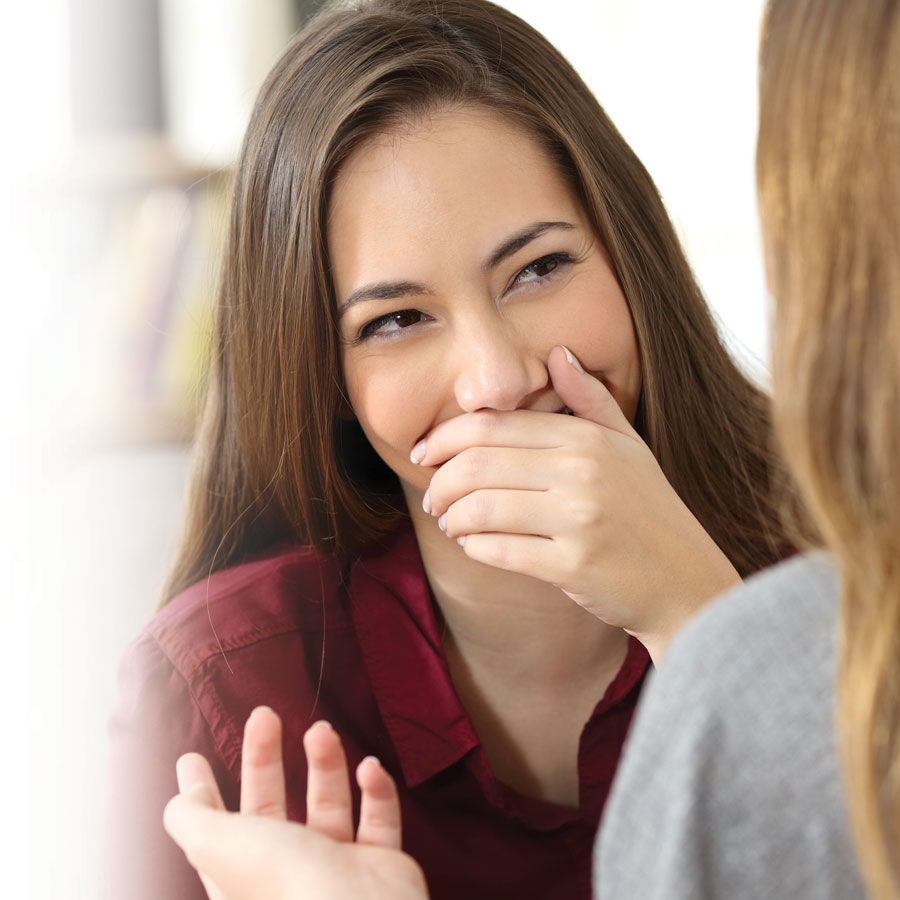It can be difficult to detect if your own breath is bad! Here are a few clues to get you on the right track and some tips on how to remedy the situation.
Do you have bad breath?
It can be difficult to tell if you have bad breath. This common problem, also known as halitosis, affects nearly 65% of the population. Fortunately, most episodes of bad breath are transient. Just think of morning breath, which can be eliminated by simply brushing your teeth.
You may suspect that you have bad breath if:
- you frequently have a bad taste in your mouth
- your gums are red, swollen and bleed easily. There may be pus
- people frequently offer you mints or chewing gum
- you often have a dry mouth and your saliva is viscous
If you have any doubt, don’t hesitate to ask. People around you will appreciate your concern for your oral health.
What causes bad breath?
Most bad breath problems originate in the mouth. Halitosis is mainly caused by the breakdown of debris and food particles by bacteria. This breakdown generates smelly gases that mix with the breath and give it that bad smell.
Many factors lead to bad breath:
- deficient oral hygiene
- the presence of cavities or defective restorations
- an accumulation of food particles between the teeth
- an infection inside the mouth
- smoking (tobacco smoke mixes with other mouth odors to create an unpleasant smell)
- a decrease in the production of saliva or its effectiveness, and
- inflammation of the gums (gingivitis or periodontitis)
Other causes of bad breath not involving the mouth include:
- infections, especially in the lungs, throat or sinuses
- poorly controlled diabetes (acetone smell)
- kidney failure (fishy smell)
- liver disease
- gastrointestinal disorders such as acid reflux
- allergic or chronic rhinitis, and
- fasting
How can bad breath be prevented and treated?
To restore or maintain fresh breath, you must follow proper dental hygiene measures:
- Brush your teeth and your tongue after each meal.
- Use an antiseptic mouthwash after brushing.
- Floss at least once a day.
- Have your cavities and defective restorations repaired.
- Quit smoking.
- Visit your dentist at least once or twice a year.
Do you like garlic?
Some food, such as onions, garlic, cauliflower and coffee, may cause temporary bad breath. These foods are absorbed into the bloodstream very quickly after ingestion and some of the odour in the mouth comes from the air exhaled through the lungs. To reduce bad breath, you can finish your meal by eating fresh raw parsley, crunching coffee beans or sucking on a clove. These are old wives’ tales that are worth trying!
Does your breath wake you up in the morning?
Morning breath is a reality for many people. If the smell does not persist during the day, it is normal. During the night, the mouth produces less saliva. Bacteria and debris can therefore produce more odour. Generally, rinsing your mouth with water, talking, drinking orange juice or eating breakfast will activate your salivary glands and reduce the smell of morning breath.
Here are some other tips to reduce your morning breath:
- Brush and floss your teeth before going to bed. This way, you will reduce the amount of bacteria in your mouth.
- Remove your dentures at night, your gums need to be ventilated. Clean and disinfect them regularly. Brush the roof of your mouth, the inside of your cheeks and your tongue every day.
- Drink a glass of water before going to bed to reduce dry mouth.
- After breakfast, floss and brush your teeth and your tongue.
- You can use a mouthwash, but it should not replace flossing and brushing.
Don’t hesitate to speak to your pharmacist if you have any questions about bad breath.

